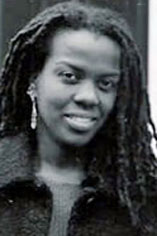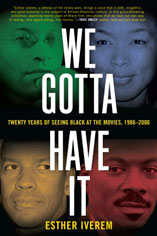New book criticizes black movie roles, even today
Kam Williams
“‘We Gotta Have It’ represents twenty years of seeing a new generation of Black movies. Before this journey began in 1986, with Spike Lee’s ‘She’s Gotta Have It,’ a Black movie meant one of the increasingly mindless productions starring comedians Richard Pryor or Eddie Murphy. Twenty years later — this era of film has created an explosion in the number of people recognized as Black movie stars. At the same time, there has also been a relative explosion of Black Film auteurs — director-producer-writers who, though toiling increasingly in the obscurity of the film festival circuit, have created and brought to the screen a fuller panorama of Black life.
What has happened between these two points in time is an amazing film journey referred to as the ‘new wave’ of Black film … Included here are reviews (many excerpted), interviews and essays about movies that we sort of claimed as ours. Movies bring words and images to us but we also bring who we are to the movies — to laugh, to cry, to tremble with fear, to gaze in awe, to grow angry, to contemplate, and, hopefully, sometimes to learn and grow.
We do keep bringing ourselves to the movies in droves. It seems we gotta have it.”
— Excerpted from the Introduction (pg. xxvii-xxx).
African Americans comprise about a quarter of the domestic movie-going audience, which translates to over $2 billion at the box office alone. For this reason, one would think that blacks would exert considerable influence over the images of themselves fashioned by Hollywood. But according to Esther Iverem, despite the significant inroads made since Spike Lee’s arrival on the scene in 1986, the film industry has a long way to go in terms of presenting authentic African American characters.
Iverem, a former staff member at the Washington Post and Newsday, is an iconoclastic film reviewer who writes from a point of view that is both black and female. “We Gotta Have It” is a collection of her insightful reviews, evocative essays and groundbreaking interviews with everyone from Lee to actors Vin Diesel and Danny Glover, author Alice Walker and director Julie Dash.
This book is worth the investment for its opening chapter alone, in which the author assesses the predicament of blacks in the United States through the prism of motion pictures. In it, she asks, “Why does a police officer feel he can get away with sodomizing us with a broomstick; shooting us, as we stand unarmed, forty or fifty times; or beating us bloody on a crowded New Orleans street?”
She argues that the answer rests with “the cinematic power of turning lies into truth.” The dominant culture presumes to know black people as a consequence of watching flicks like 2001’s “Monster’s Ball,” for which Halle Berry won an Academy Award. However, Iverem suggests that Berry’s award victory might have had a lot more to do with the actress fulfilling white male sexual fantasies than her portraying a recognizably realistic African American female.
Iverem concludes it is “the least attractive, the most criminal, the most seedy part of us, that is then made to become representative of us all.” Such astute observations abound in the aforementioned intro, and only lay the groundwork for the numerous pithy comments contained in the ensuing, chronologically-arranged entries.
On “Soul Plane:” “How many different ways can a film call me a nig? Will we ever learn the difference between a film laughing with us, rather than laughing at us?”
On “Monster’s Ball:” “Tries to convince us, in a raw, depressing Southern Gothic style, that a Black woman in a small Georgia town will turn to a white man, who is an open racist, for sexual comfort and companionship.”
On “8 Mile:” “Blacks make an issue of race. B-Rabbit never does, and neither do the trailer park White people he comes from. How real is that?”
On “The Last King of Scotland:” “It goes on, based on who knows what, to picture African women as easy and available sexual partners … What looks deceptively like history writ large on the big screen turns out to be, partly, some White boy’s wet dream.”
A critic who can skewer so succinctly and delightfully is rare enough indeed. But when you couple that talent with an uncompromising, unique black feminist perspective, now you’re talking about a sister with a seminal voice deserving of much wider recognition.
|
| Esther Iverem’s “We Gotta Have It” studies the portrayal of blacks in American film. (Photo courtesy of www.seeingblack.com) |
|








